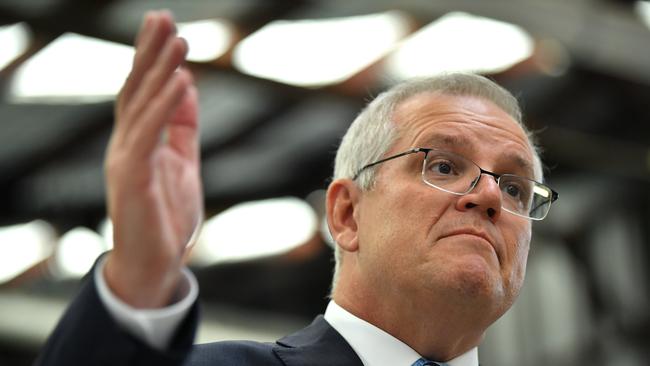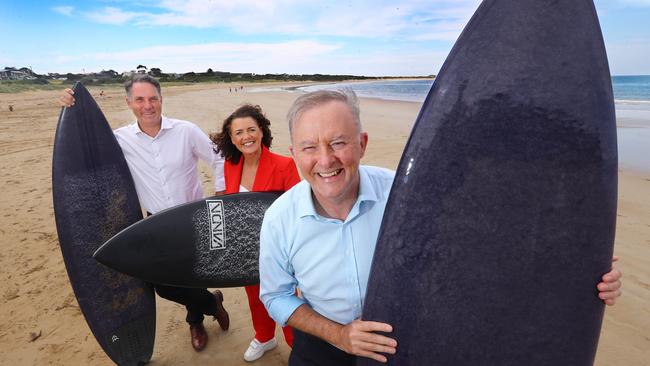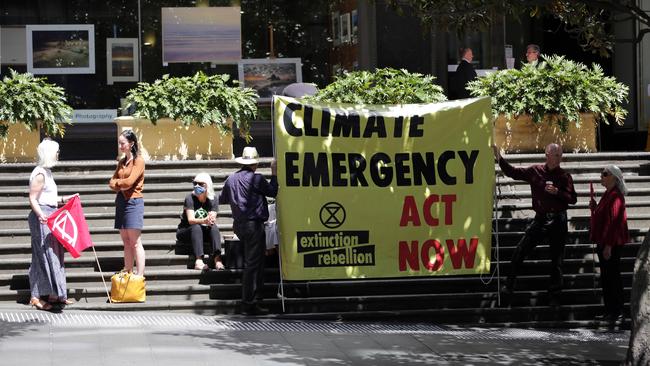Dawn of realism a test for Scott Morrison
After the most intense year of decision-making since World War II, an ascendant Scott Morrison is suddenly vulnerable.

The test for Australia now is whether it seizes defeat from the jaws of victory. Having delivered a world-beating economic and health response to the pandemic, having set ourselves up with a proven record of competent government, effective social contract, substantial results and soft power allure, the test is whether the old destructive demons will be unleashed.
Those demons are well known. They have plagued Australia’s performance for much of the past 15 years — third best policy, unconvincing governance, parliamentary sabotage, voter distrust, poll-driven short-termism and renewed culture war.
The issue is whether 2020 was an Australian aberration. That is a test for ourselves, our community leaders, our media, and our politicians.
It is a test of whether the political centre can hold, whether opportunism will prevail and whether the system can introduce necessary changes to advance the cause of women against sexual violence without a culture war that discards core principles.
Above all, it is a test for the Morrison government. “It’s been the toughest year our country has seen since the Great Depression and the Second World War,” Morrison said this week. “But here we are, leading the world out of the global pandemic and the global recession it caused.” The $251bn fiscal support packages have salvaged millions of lives, jobs and businesses.
But there is an erupting multi-headed reality. The government is besieged by a dangerous combination of events and mishaps that will expose its real character. It has two ministers — Attorney-General Christian Porter and Defence Minister Linda Reynolds — on health leave with demands for their resignations. Its much-heralded vaccine rollout is behind schedule. Its IR reform package confronts an uncertain fate in the Senate. It faces a transition out of JobKeeper. Morrison must now juggle domestic and global pressures in the move to net-zero emissions at 2050. His authority as PM will be tested as he tries to persuade the premiers to fully reopen borders and embrace less onerous rules for COVID management. And his government’s attitude towards rape allegations is being exploited by Labor and media critics to argue that Morrison, in political terms, has a problem with women and values.

The uniform theme in such tasks will become Morrison’s credibility. Whether these events constitute a passing storm or a decisive change in the political climate remains unknown. But recall the history since 2013 — this period of Coalition government is marked by progressives winning culture war battles but losing general elections.
A prime minister’s life is filled with judgments over when to hold firm and when to move. Morrison’s message on Porter’s future is that he will not succumb to trial by media or demands of the “mob”. The government believes there is a split over Porter between “insider” opinion makers insisting the country has changed fundamentally, and the “quiet Australian outsiders” who, as parents, have both sons and daughters to protect as distinct from politicisation of rape allegations. Yet sexual violence against women is a national disease and Morrison must both act and be seen to act.
As Morrison argued this week, Australia now enters a new recovery phase in the pandemic cycle — where building the scale and skills of the workforce is “the single greatest economic challenge”, where the productivity gains from digital advances must become core business, and where it is imperative to prepare for the impact of climate change that Morrison says is “simultaneously reshaping the global economy, global politics and the global energy system”.
A new realism is dawning. The post-pandemic policy task will be immense, while the politics gets harder and the voters more demanding.
So much for the assumption a few weeks ago that Morrison would cruise to an early election in late 2021. Morrison, usually more realistic than his critics, never believed that.
The Morrison government’s success in 2020 transcended the immediate pandemic challenge. This offered a threshold moment for Australia. It became the opportunity to break free from the entrenched public lethargy, ugly polarisation and disintegration of shared values that had engulfed our politics since the end of the Howard era. The question for 2021 is whether Australia moves to a better policy framing or reverts to the bad habits of the recent era.
This period was described in the just-released Monash University publication A Decade of Drift, by former Treasury and Prime Minister and Cabinet chief Martin Parkinson: “Having joined Treasury as a cadet in 1980, my working life for 28 years saw Australia served by just four prime ministers, Malcolm Fraser, Bob Hawke, Paul Keating and John Howard. In contrast, the last 12 years of my professional public service career saw a giddying six occupants of the prime minister’s office: Kevin Rudd, Julia Gillard, Kevin Rudd again, Tony Abbott, Malcolm Turnbull and Scott Morrison.
“While each prime minister has had a view of the national interest at heart, the 17 years since John Howard’s last election victory have been characterised by an absence of a vision for Australia that the public has found compelling. Australian voters have neither been captured by the need to respond to the circumstances we confront, not excited by a future unfolding.
“Our social cohesion has been damaged and the gaps in our society wedged further apart by a fracturing of the political centre. The sharp decline in trust in many of our institutions of power and influence — be they government, business, non-government organisations (for example, churches) or the traditional media — suggest something far deeper is at play, not only in Australia but across the Western world. While the causes are doubtless complex, it is highly likely that social media, and the ability to source information from an echo chamber of people sharing one’s own views, has contributed to this situation.
“As Australia attempts to start the recovery from the COVID-19- induced economic shock, the current circumstances risk hobbling our ability to take the actions necessary to return to a pathway of growth in economic activity, employment, incomes and living standards.”
Parkinson talks about the disintegration of shared norms. Examples abound. His main theme is the failure to settle on clear principles to tackle climate change. But he highlights the demise of consensus within the economics profession, since the 2008 global crisis, on the required economic policy direction. While politics is ever-present, Parkinson says “some degree of consensus” is needed to successfully confront economic rebuilding post-COVID and the climate change challenge.

Critical policy decisions lie ahead. The divided royal commission on aged care is a monumental policy task that addresses a core Liberal constituency and constitutes pressure for higher taxes, an unpalatable option for the government. The full ambit of changes to superannuation lies ahead, along with whether the government enters a political war with Labor and the industry funds.
The projected closures of coal-fired power plants will test energy policy anew and expose energy investment obstacles inherent in current policy.
But the past three weeks proves another eternal truth: politicians are at their worst when fighting about their own ethics, rules and standards — both in the cabinet and in Parliament House.
The public will be dismayed by the rape allegations, from the Brittany Higgins incident to the 33-year-old allegations against Porter. Frankly, it should not be hard to settle on new procedures within Parliament House — an independent source where such allegations can be lodged; an obligation upon any minister to inform the PM about a serious event; the immediate reference to the police; and if a woman who is a victim of an assault wishes to keep it private, a procedure to effect this option.
Labor will attack Morrison over justice for women when the parliament resumes. It is idle to think the government will not be damaged. The risk lies with the female vote and, perhaps more significantly, with the youth or under-35 vote.
The political value of these events for ALP leader Anthony Albanese is the opportunity to damage Morrison’s leadership brand, given the huge lead he enjoys over Albanese.
Morrison’s greatest asset is his authority. Without authority, no PM can survive. Denouement may come sooner or later, but it will come.
Along the journey, your agenda will be compromised or ruined as your opponents exploit your weakness. The historic test for Morrison is whether he becomes the first PM since Howard to win two successive elections and restore functioning stability to the system.
The immediate issue is whether the 2020 decisive boost in public trust of Australian leaders and the political system — driven by successful pandemic management — will be cancelled. Will the reversion to: gotcha” politics, populist and tribal prejudices, special interests and hysterical social media mean that even modest reforms are sabotaged?
The IR package now assumes a dual significance. It is both a job-creating project and a symbolic test of the parliament’s ability to meet the post-COVID challenge.
Tough decisions will be needed in the recovery phase. The fiscal handout mentality, the product of the crisis, must be curbed despite fierce resistance. The “closed border” reflex, perfected by most premiers outside NSW as a guaranteed vote-winner, must also be purged and Australia returned to its national integrity.
Don’t count on the premiers. They have cultivated a destructive brand of pandemic protectionism that exploited public fear and seeded a counter-productive introspection. The premiers are the political winners from the crisis. The greatest champion of closed borders, Western Australia’s Mark McGowan, will win a smashing re-election on Saturday. That will be a justified win on merit. But it will also be a vindication of his “closed border” fanaticism.
“The 2020 response to COVID-19 must be different in 2021,” Morrison said. “Why? Because the risk has changed.” Morrison’s message is that once the old, vulnerable and frontline workers are vaccinated, the balance of risk between health and economy changes. He wants a new national compact to recognise this. But that depends upon premiers surrendering some of their authoritarian powers and their vote-winning “closed borders” formula.
The economic recovery is coming faster than expected. Growth of 3.1 per cent in the December quarter proved this point. But this recovery will be unique — the economy and energy policy will be tied together.
Australia’s energy restructuring and emission reductions must become integral to the post-pandemic recovery. Morrison knows this. It will become the global mantra under the influence of the Biden administration. Morrison is selling emission reduction as an economic opportunity while offering reassurance to fossil fuel regional jobs — a message that demands immense skill and difficult navigation within the ranks of conservative politics.
What destroyed the past four Australian prime ministers? It’s what I call thwarted reform syndrome (TRS). Rudd and Gillard were found wanting over energy and climate change. Abbott never recovered from his inaugural budget to tackle the fiscal deficit. Turnbull fell twice, as opposition leader and then as PM, over the politics of climate and energy. It is true these leaders were guilty of political ineptitude. It is also true they fell because of the mobilised power of negative politics.
They failed at the reform hurdle. The forces of resistance were too strong. At the 2019 election, Bill Shorten offered Morrison an inviting target and Morrison waged an effective negative campaign against Labor’s higher and redistributive taxes. Labor has not forgotten it.
Volatility, fragmentation and fickleness are embedded in our political culture. The leader the people praise today is the leader they condemn tomorrow. Good government hinges on competent political parties, but both the Liberal and Labor parties suffer from serious internal weakness.
Still, Morrison has an advantage. Since becoming leader, he has been chronically underestimated. Labor dismissed him as a shallow marketing man, rejected his chance of winning the 2019 election, and was sceptical of his ability to handle the pandemic crisis. The next test is at hand.


The Morrison government and the political system have reached a crossroads. After the most intense year of decision-making since World War II, an ascendant Scott Morrison is suddenly vulnerable, with the risk that politics will sink into convulsion and paralysis.